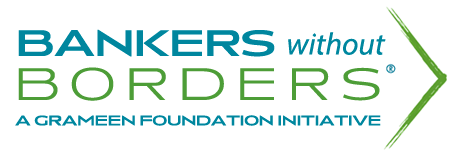 Corporate volunteer programs can create significant value for the causes served, the company sponsoring the programs, the employees who volunteer, and the nonprofits that participate. In late 2008, Grameen Foundation launched Bankers without Borders® (BwB) to build the capacity of poverty focused social enterprises to manage and scale their operations and to expand their services to the poor; increase volunteerism in the social sector; and create an efficient operational framework to mobilize, engage, and leverage the resources of the private sector and volunteer consultants to support Grameen Foundation’s mission of eradicating world poverty.
Corporate volunteer programs can create significant value for the causes served, the company sponsoring the programs, the employees who volunteer, and the nonprofits that participate. In late 2008, Grameen Foundation launched Bankers without Borders® (BwB) to build the capacity of poverty focused social enterprises to manage and scale their operations and to expand their services to the poor; increase volunteerism in the social sector; and create an efficient operational framework to mobilize, engage, and leverage the resources of the private sector and volunteer consultants to support Grameen Foundation’s mission of eradicating world poverty.
Like most volunteer initiatives, Bankers without Borders has multiple stakeholders with different needs. Volunteer consultants require well-managed, structured projects while also placing great value on training, development, and networking opportunities. Companies or universities are looking for turnkey volunteer engagements that are well aligned with their strategic objectives, geographical interests, and core competencies. Our social enterprises are looking for the equivalent of free skilled volunteer consultants who are knowledgeable and accountable for clear deliverables. And, all three stakeholder groups want to ensure that volunteer engagements result in measurable results and social impact.
When collaborating with corporate partners or higher education institutions, Bankers without Borders developed what we call the “5P approach”:
- Program Design: What is the company trying to achieve with its volunteer program? Are there particular issues that connect to the core business or resonate with the employees? Through an iterative and interactive process, BwB designs an employee engagement program uniquely tailored to meet the company’s needs. Together, we identify the optimal program duration, participant selection, project scope, and target geographies. Making deliberate choices about what activities or causes the company will and will not contribute to is very important.
- Policy: From very early on, BwB tries to gage the company’s existing policies in support of its employee engagement program (Eligibility? Leave policy? Approvals? Virtual vs. on-site? Etc.) and works to ensure that we abide with all the policies in place and advise the company if other policies should be in place. Before finalizing any placement, BwB works closely with the corporate partner to make sure all approvals are in place.
BwB meets regularly with its corporate contacts to provide program update, identify future opportunities, resolve any challenges and provide ongoing support. Assigning a dedicated staff at the company to help manage the volunteer program is valuable as it creates awareness of the program, helps communicate volunteer opportunities internally, generates enthusiasm, and ensures the program’s tenure and success. This also sends the message that the program is taken seriously and professionally managed by the company.
- Participation: Is employee engagement open to everyone in the company or targets a subset of employees? BwB makes sure to present projects utilizing a wide range of skills and appeal to a variety of interests to ensure that there is something for everyone.
On many occasions, companies have tasked BwB to present a project targeting a subset of employees over a specific engagement or time frame, for example in celebration of International Women’s Day or pro bono week.
- Partnership: BwB has partnered with over 170 poverty focused social enterprises worldwide. BwB follows a thorough due diligence process to ensure all of the social enterprises are aligned with Grameen Foundation’s mission, and are capable and invested in managing volunteer consultants. In our experience, long-term, strategic partnerships have delivered the most value to the social enterprises served. Collaborating with these social enterprises, companies and universities are presented with various ways to support the organizations, in mutually reinforcing ways, by drawing on the skills and availability of their employees and achieving long term impact for the organizations served.
- Project Management: The Bankers without Borders model differentiates it from other volunteer organizations largely because of its high touch and efficient approach. The project scoping that BwB provides (clearly defined need, challenges, goals and expectations, and realistic and specific deliverables within a defined timeline) coupled with the use of technology and human intervention to match volunteer consultants to client needs makes the process seamless, effective and efficient. This same technology allows for real-time reporting capabilities on progress and impact. At its core, BwB is a volunteer management model designed to:
-
Identify the resource needs of social enterprises fighting global poverty.
-
Recruit, screen, orient, and train volunteer consultants.
-
Provide a standard methodology to develop and implement project activities that will have demonstrable results.
-
Provide ongoing communication and project management support to all involved: the volunteers, corporate partners, and the social enterprises.
-
Evaluate the impact of each project.
-
Recognize each volunteer contribution.
-
Volunteering with Bankers without Borders provides volunteer consultants a unique opportunity to use their capabilities in different contexts, develop new skills, collaborate both within and outside of their organization and broaden their horizons. Our disciplined and high touch approach ensures that almost all of our volunteer engagements have a positive impact on the volunteer consultants, the organizations and our corporate partners.
Sabrina Quaraishi is the Senior Program Manager for Bankers without Borders.

